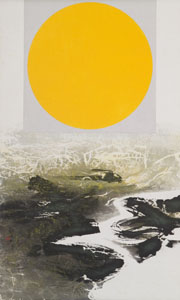
Arts of Asia Fall 2016 Lecture Series - From Monet to Ai Weiwei: How We Got Here
Videos of the lectures are now available on the Asian Art Museum's Apple Podcasts. Click here to view the available videos from this lecture series.
Where did modern Asian art come from? What is contemporary Asian art? Sign up for this lecture series and find out! Inspired by the recent exhibitions Looking East, 28 Chinese, and First Look, the Society for Asian Art’s Fall 2016 Arts of Asia lectures will explore how Asian art has been transformed from the past into something new and relevant for the present in the 19th to 21st centuries.
The series will start with a two-lecture overview covering important 19thand 20thcentury art movements, such as impressionism, surrealism, abstraction, and conceptualism. Prominent scholars like Joan Kee and Ming Tiampo will then examine the development of late 19thcentury and early 20thcentury pre-war Asian art from areas like Meiji Japan and colonial Southeast Asia through post-war movements like the Gutai Group in Japan, the '85 New Wave in China, and Korea's Avant-Garde Association. The legacy of classical Chinese traditions, Indian nationalism, and Islamic attitudes toward art will also be considered against the backdrop of modernism, concluding with an examination of globalism, new media, and biennials.
August 19
Where do we come from? What are we? Where are we going? Gauguin & Early Global Modernism Study Guide Chinese Art World Modernisms Cosmopolitanism, Gauguin's Noa Noa is widely available as an ebook, including from Project Gutenberg: http://www.gutenberg.org/ebooks/11646, LaForgue's Impressionism: https://msu.edu/course/ha/240/laforque.htm, Louis Leroy's review of the Exhibition of the Impressionists: http://www.kbcc.cuny.edu/academicdepartments/art/Documents/35LeroyText.pdf
Karin Oen, Asian Art Museum
August 26
European Modernism and Its Global Repercussions in the First Half of the 20th Century Study Guide Breton and Trotsky Chippon Dada Crozier Manifesto Mitter Willett
John Zarobell, University of San Francisco
September 2
The Rise of Imperial Japan: Japanese Arts & Crafts of the Taisho & Showa Eras Study Guide
Kendall Brown, Cal State Long Beach
September 9
The Bauhaus in Bengal: Reflections on Art & Design in Modern India Study Guide Additional Reading
Saloni Mathur, UCLA
September 16
Where the Ancient Never Tread: Dunhuang as a Source of Artistic Inspiration Study Guide
Joseph Scheier-Dolberg, Metropolitan Museum of Art
September 23
Rise of the East: Modernity & Modern Diaspora Chinese Art of the Postwar Era Study Guide
An-yi Pan, Cornell University
September 30
Artisans to Artists: Colonial & Post-Independent Art Education in Vietnam and Cambodia Study Guide
Nora Taylor, School of the Art Institute of Chicago
October 7
Warhol & Mid-Century Modernisms: Arts is anything you can get away with Study Guide Art is Anything You Can Get Away With Judd Mcluhan Mulvey
Karin Oen, AAM
October 14
The International Art of a New Era: Postwar Japanese Art's Challenge from the Margins Study Guide
Ming Tiampo, Carleton University (Ottawa)
October 21
Thirteen Ways of Looking at Abstraction Study Guide
Joan Kee, University of Michigan
October 28
Looking for the Contemporary in “Islamic” Art Study Guide
Talinn Grigor, UC Davis
November 4
Everyday Partitions: Contemporary South Asian Art Study Guide
Sonal Khullar, University of Washington
November 11
Extreme Reverberations & the Existing Real: The Birth of Contemporary Chinese Art Study Guide Chinese Contemporary Art-7 Things You Should Know
Taliesin Thomas, Director – AW Asia
November 18
Who Am We? Five Contemporary Artists of Korea Study Guide Bibliography
Hyonjeong Kim Han, Asian Art Museum
December 2
Globalism & New Media: The Long History of World’s Fairs & Biennials Study Guide
Caroline Jones, MIT
Registration Policies
The Society for Asian Art's cancellation policy requires at least one week's advance written notice in order to receive a refund of registration fees. This excludes our Travel programs, which have separate cancellation policies, as well as any programs where a specific refund policy is stated on the event page. Your fees will be returned to you through a check in the mail. To cancel, please contact us.
For programs located within the Asian Art Museum, the museum entrance fee must be paid separately and is not included with your registration fee.
Please note that by registering for a program, you are giving consent to the SAA to be photographed or videoed as a participant.
